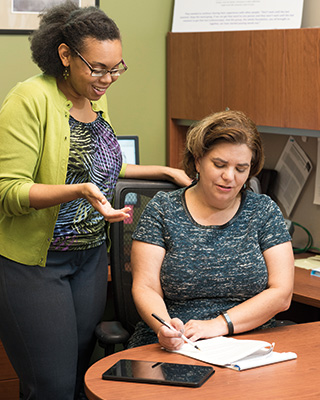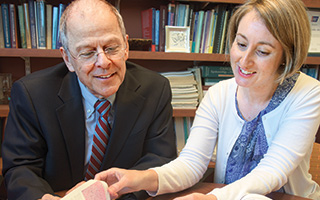Study explores impact of inability to pay

In a 2014 study, conducted after implementation of the Affordable Care Act (ACA), the Henry J. Kaiser Family Foundation reported that low-income Missourians still struggled to afford medical costs. A third of those enrolled in MO HealthNet, the state Medicaid program, were not confident they could afford usual or major medical costs. Among uninsured Missourians, more than three quarters could not afford usual medical costs, and nine in 10 reported they were unable to pay major medical costs.
Public health sciences researcher Aimee James, PhD, MPH, says the inability of low-income people to pay medical costs and the resulting lack of adherence to medical treatment plans is a long-standing problem that has remained relatively constant in Missouri, a state that did not expand Medicaid under the ACA. She hopes her work funded by a new grant will help the uninsured and underinsured — along with their providers — find solutions.
“We still have patients who make too much for Medicaid and too little for the ACA subsidies,” says James. “With the insured, there are still co-pays and medications. We decided to try to address these issues.”
Under a grant from the National Institute on Minority Health and Health Disparities, James and her coworkers are recruiting patients with one or more chronic health conditions at federally supported health centers and from the community at large. The researchers will survey study participants about financial strain and the strategies patients use to follow their doctors’ instructions. Are they taking one medication but not another? Are they going to the food pantry instead of the grocery store to save money? Are they skipping their medicines altogether?
The next steps will be making health providers more aware of their patients’ dilemmas and developing an intervention program that helps bring patients and providers together to discuss options. An end goal will be a resource guide and strategic intervention to close the gaps.
“I would love to test the findings in a larger trial,” says James. “Is there time for physicians and patients to have longer conversations about less expensive prescriptions and other alternatives? We would like to make that happen.”
Highlights

MORE THAN HALF OF CANCERS could be prevented by simply applying knowledge that we already have, according to a study reported in the New England Journal of Medicine and conducted by Division Chief Graham Colditz, MD, DrPH, and Karen Emmons, PhD, of the Harvard T.H. Chan School of Public Health. Tobacco use, inactivity and obesity are all modifiable risk factors. Smoking cessation at age 50 reduces lung cancer deaths by 62 percent; human papillomavirus (HPV) vaccination protects against cervical, penile, anal and oral cancer; screening patients with a genetic risk for colorectal cancer reduces mortality up to 70 percent. Colditz and Emmons also were advisers for the national Cancer Moonshot initiative. Colditz is shown above with his division colleague Siobhan Sutcliffe, PhD, ScM, MHS.
MARY POLITI, PHD, continues to update her website showmehealthplans.org, which has for the last two years provided health insurance education and a tool to compare costs among insurance plans available in Missouri under the Affordable Care Act. She also has received an American Cancer Society grant to build a similar tool for cancer patients.
THE UNITED NETWORK FOR ORGAN SHARING (UNOS) has developed a new policy that seeks to provide more equitable medical guidelines in deciding kidney allocation for patients receiving a liver and kidney at the same time vs. patients who receive only a kidney. During the policy review period, health economist Su-Hsin Chang, PhD, used historical data and past trends to create a simulation model that projected the life expectancy and quality-adjusted life years for both sets of patients under the proposed policy. The data enabled UNOS to evaluate the policy’s impact.